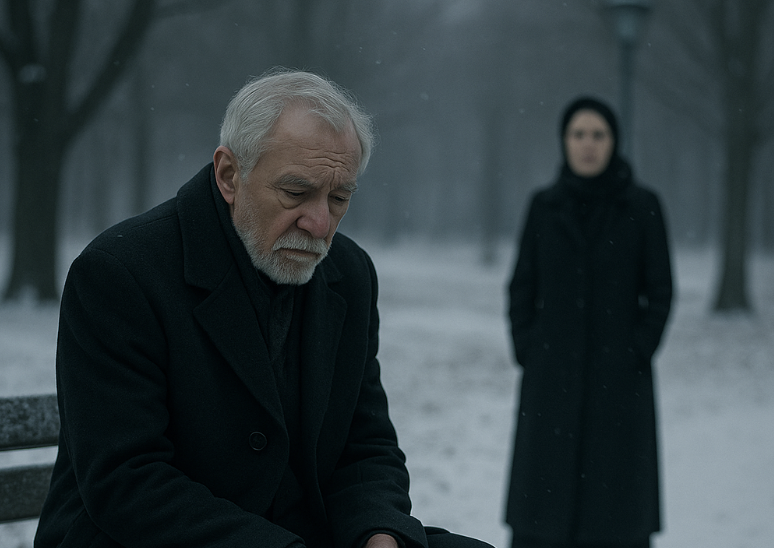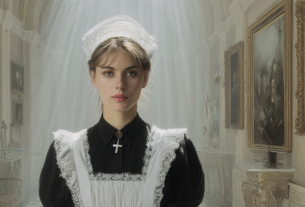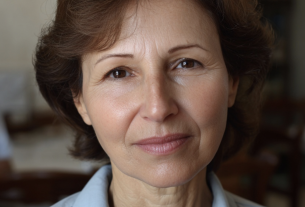He sat on the cold metal bench, wrapped in a threadbare cloak—the same one he used to wear as a housing maintenance foreman. His name was Nikolai Andreevich: retired, widowed, father to one son, and—so he had once believed—a contented grandfather. All of that unraveled in a single day.
When his son brought Olga home, a chill slid through Nikolai. Her energy was too sharp, her smile too practiced, her eyes cold behind their charm. She never raised her voice or staged scenes; she simply edged out anything that stood in her way. Nikolai sensed it at once, and yet by then the tide had already turned.
First, small things vanished. Books were hauled to the attic. His favorite armchair became “clutter.” Then the kettle disappeared. After that came the nudges: “Dad, why not get more fresh air? Walking is good for you.” And finally the proposal: “Maybe a retirement home would be better—or Auntie’s place, out in the country.”
Nikolai said nothing. He gathered what remained of his belongings and left. No recriminations, no pleas, no tears—only a quiet pride and a pain pushed deep.
He drifted through the snowbound streets like a ghost. Only one bench in the park offered him a mooring—the place where he used to stroll with his wife, later with his small boy. There he sat for hours, staring into the white hush.
On an especially bitter day, when the frost needled his cheeks and cold blurred his vision, a voice called:
“—Nikolai? Nikolai Andreevich?”
He turned. A woman in a warm coat and headscarf stood there. He didn’t place her at once, and then memory guided him: Maria Sergeevna. His first love. The one lost to his job, then to time, before he married Lydia.
She held a thermos and a paper sack of homemade pastries.
“—What are you doing out here? You’ll freeze…”
That simple question, saturated with concern, warmed him more than any coat. Nikolai accepted the thermos and the buns in silence. His voice had worn thin, and his heart ached too much for tears.
Maria sat beside him as if no years had passed at all, as if time had stalled.
“—I walk here sometimes,” she said softly. “And you—why are you here?”
“—Familiar ground,” he answered with a faint smile. “My boy took his first steps here. You remember?”
Maria nodded. She remembered.
“—And now…” Nikolai sighed. “He grew up, married, moved into a flat. His wife told him, ‘Choose—me or your father.’ He chose. I don’t blame him. The young have their own storms.”
Maria said nothing, only studied his reddened, cracked hands—so known to her once, so solitary now.
“—Come to my place, Kolya,” she said suddenly. “It’s warm. We’ll eat, and tomorrow we’ll sort things out. I’ll make soup. We’ll talk. You’re not a stone; you’re a person. You shouldn’t be alone.”
He didn’t move for a long while. Then he asked, barely above a whisper:
“—And you… why are you alone?”
Maria exhaled; her eyes filmed with glassy light.
“—My husband died long ago. My child… never drew breath. After that—work, pension, a cat, knitting. Round and round. You’re the first person I’ve shared tea with in ten years who isn’t just myself.”
They lingered there. Passersby thinned. Snow fell softly, as though muffling hurt.
The next morning Nikolai woke not on the bench but in a small, cozy room with curtains scattered in daisies. The house smelled of pastries. Winter iced the trees outside; within, a peculiar peace had settled, as if someone had returned him the right to live.
“—Good morning!” Maria came in with a plate of syrniki. “When did you last have a homemade meal?”
“—About a decade ago,” Nikolai said, smiling. “My son and his wife mostly ordered in.”
Maria didn’t pry. She fed him, tucked a blanket around him, and switched on the radio to keep the rooms from feeling too quiet.
Days slipped into weeks. Nikolai seemed to thaw. He fixed chairs, kept the little house in order, and told stories—about the housing office, about the time he pulled a coworker clear of a gas blast. Maria listened. She simmered the soup he remembered from childhood, scrubbed his socks, knitted him a scarf, and gave him what he hadn’t felt in years—care.
Then, one day, everything shifted.
Maria was returning from the market when she noticed a car by the gate. A man stepped out—Nikolai would have known him anywhere. Valery.
“—Hello… Excuse me… Does Nikolai Andreevich live here?”
Maria’s heart tightened.
“—And who are you to him?”
“—I… I’m his son. I’ve been looking for him. He left, and I didn’t know… Olga is gone. Turns out, all this time…” He dropped his gaze. “I won’t pretend otherwise. I was a fool.”
Maria studied him.
“—Come in. But remember: your father is not furniture to be moved as you please. He doesn’t have to go back just because you’re lonely.”
Valery nodded.
“—I understand.”
Inside, Nikolai sat in an armchair with a newspaper. One glance told him why his son had come. His chest filled with the ache of years—of cold, of nights without shelter.
“—Dad…” Valery rasped. “Forgive me.”
Silence settled. Then Nikolai said:
“—You could have said those words sooner—before the bench, before the nights under the bridge, before all of this. But… I forgive you.”
A single tear rolled down his cheek—heavy, like memory; warm, like pardon.
A month later, Valery asked his father to come home. Nikolai declined.
“—I’ve found a small corner of my own,” he said. “There is warmth here, and real tea, and someone who waits for me. I’m not angry. I’m simply done starting from scratch. Forgiving isn’t the same as forgetting.”
Two years on, Nikolai and Maria returned to the park bench together. They held hands, fed the birds, and drank from the same thermos. Sometimes they sat in companionable silence; sometimes they spoke of everything.
One day, standing in the street, Nikolai lifted his face to the sky and murmured:
“—Life is strange. They push you out of your house and you think you’ve shattered. Then someone arrives—not from a threshold, but from a warm heart—and gives you a new home made not of walls, but of love.”
Maria embraced him.
“—Then it was worth meeting again—even on a park bench.”
They lived quietly. They didn’t rush to register anything, didn’t call each other husband and wife. Yet the house held a family—unseen, but present in everything. Mornings began with the whistle of the samovar, the scent of fresh tea, and Maria humming at the stove. Their bond lived not in words but in deeds, in glances, in small motions.
One spring day Valery returned—this time with a boy of about eight.
“—Dad…” he began carefully. “This is Sasha. Your grandson. He wanted to meet you.”
Nikolai went still. The child lifted his eyes, trusting and shy. In his hands was a drawing: an old house, a tree, two figures on a bench.
“—This is you and Grandma Maria,” he said. “Dad told me. I want a grandpa.”
Nikolai knelt, gathered the boy in his arms, and felt warmth settle in his chest.
From then on, Sasha wove himself into their days. He didn’t just play in the yard; he brought the house to life. Nikolai took up making things again—swings, a toy boat, repairs on an old radio. In the evenings he read stories to his grandson, as he once had to his son.
Watching them, Maria said gently:
“—Kolya, you’re living again. Not just getting by—living.”
He clasped her hand and pressed it to his cheek.
“—Because of you.”
That autumn, Nikolai did something he had never quite dared. He carried a marriage application to the registry office. He and Maria were married before four witnesses—Valery and Sasha among them. No fuss, no gown, no banquet. Just two people who had found each other after a very long road.
When the clerk smiled and remarked that they were late in life, Maria answered:
“—Love doesn’t keep a calendar. Either it is, or it isn’t. For us, it is. And we chose well.”
Years passed. Nikolai began to write. From worn notebooks grew the story of his life—from a childhood in the postwar yard to his years at the housing office, from losing Lydia to being cast out, and then—finding Maria. He wrote it all for his grandson, so the boy would know: life isn’t always fair, but light still finds a way in.
Sasha devoured the pages.
At sixteen he said:
“—Grandpa, I want to turn your notes into a book. People should know: you can’t abandon the ones you love, you can’t be blind to others’ pain. You must learn to forgive—and to walk away when it hurts.”
Nikolai nodded, wordless. He had never felt prouder.
One afternoon Olga appeared at their door, unexpectedly. She was gaunt, hair streaked with gray, eyes empty.
“—I’m sorry,” she said. “I lost everything. The man I left for was no one. Health failed, money went… I thought you stood in Valery’s way. Now I see: you were his anchor.”
Nikolai looked at her for a long time.
“—I’m not angry,” he said at last. “But I won’t invite you in. This house is kind. You brought cold. You want to warm yourself now where you never cared to feel warmth. It doesn’t work that way. I wish you peace—but not here.”
He closed the door.
Ten years later, Maria slipped away quietly. She didn’t wake in the morning. The room smelled of lilies of the valley—her favorite. Nikolai sat beside her, holding her hand, whispering thanks. He didn’t weep. He only murmured:
“—Thank you. I’ll be along. Wait for me.”
Neighbors came, acquaintances came, children from the playground came to the funeral. Everyone knew Marusya—gentle, steady, with tea at the ready and a shoulder to lean on.
Sasha finished the book and called it:
“The Bench Where Life Began.”
He dedicated it to his grandparents. Thousands read it. Letters poured in—thanks for the honesty, for the truth, for the reminder that love and home can be found even late in life.
And Nikolai… lived a while longer. One day he lay down on that same bench where everything had begun. He closed his eyes and saw Maria walking through the snow, smiling.
“—Time to go home, Kolya,” she said.
He smiled and stepped toward her.
Epilogue.
Now a small plaque rests on that bench:
“Here, everything changed. Here, hope was born.
Do not pass the elderly by—they need love too.”
Every evening, grandchildren sit there holding the hands of their grandparents. Because love is not in ceremonies; it is in the quiet words:
“I found you. You are not alone anymore.”



